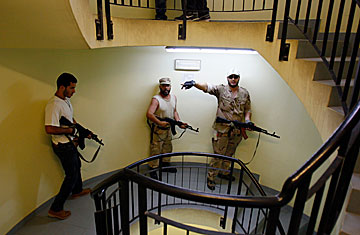
Libyan rebels search a house in Tripoli, Libya, on Aug. 24, 2011
Fathi Sherrif is surprisingly good-humored for a man who spent 13 days struggling to breathe inside a steel container. "There was no food. No toilet. 'You don't have to pray because you don't know Allah. Gaddafi knows Allah.' — That's what they'd say to us," he says of his captors. Sherrif and his five brothers were thrown in jail last March for offering covert support to Libya's then nascent rebellion. But when the rebels breached the walls of Ain Zara prison two weeks ago, the 49-year-old businessman emerged as an influential player in the new Libya. His self-appointed task: hunting senior officials of Muammar Gaddafi's regime.
"We have eyes everywhere. We have our people looking," he says from his new makeshift office on the ground floor of Gaddafi's ransacked internal security headquarters. Most of his men are former prisoners, their discipline and dedication driven, at least in part, by personal vendetta. "We have approximately 15 volunteers — they work out of their cars," Sherrif says. "It's not that [National Transitional Council leader] Mustafa Abdel-Jalil won't pay us, but we don't want it. We are working for free."
In the post-Gaddafi Libya, the hunters have become the hunted.
In just two weeks on the job, Sherrif estimates that his unit has captured some 35 high-value detainees, including several ministers and Gaddafi aides. "God wants us to catch them alive," he says coolly. One of his captives was Ahmed Ramadan, a top Gaddafi aide tagged by other senior regime officials as the man responsible for relaying all of the dictator's orders until the fall of Tripoli. Sherrif's men found Ramadan on a farm in Seraj, on Tripoli's outskirts. And when they burst into the house where he had been hiding, they say Ramadan pointed a gun at his head and tried to kill himself. He pulled the trigger but somehow survived and was taken to Tripoli's central hospital. When he stabilized, they moved him to Matega, a military base that rebels have turned into their Tripoli command center and central prison facility.
Another prisoner at Matega, they say, is Bashir Saleh, accused of being a regime bagman and fixer who allegedly met with France's President Nicolas Sarkozy on Gaddafi's behalf last month. But the process of bringing former regime officials to justice is hardly an orderly affair. Sherrif's men were never officially designated as a regime-hunting unit. But then again, there isn't one. "I think it's really a disorganized process," says Fred Abrahams of Human Rights Watch. "I don't have a sense that it's a coordinated process or there's a special unit in charge."
Indeed, the rebels' National Transitional Council is still in the process of relocating its operations to Tripoli from their eastern stronghold of Benghazi; its leader, Abdel-Jalil, arrived in the capital only on Saturday. And although a Justice Minister exists ("Mr. Darat," Sherrif says. "I can't remember his first name"), the transitional authorities are predominantly focused on the threat of violence from Gaddafi's lingering strongholds, restoring basic services and managing emerging political rifts within the rebel ranks. So in the absence of functioning courts, lawyers — or even laws — justice in the new Libya remains largely a vigilante affair.
